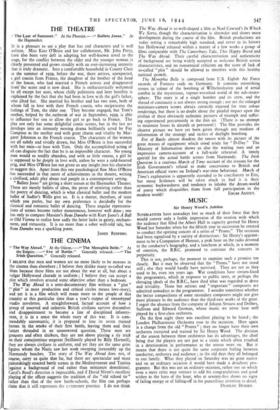THE CINEMA
" The Way Ahead." At the Odeon.----" The Memphis Belle." At the Empire. —" Eve of Battle." Generally released.—" The Irish Question." Generally released.
I BELIEVE that men and women are no more likely to be morons in the cinema than elsewhere ; I believe they dislike many so-called war films because these films are not about the war at all, but about a vulgar Hollywood charade in uniform ; I believe they can accept a plot which revolves around some objective other than a bedroom.
The Way Ahead is a semi-documentary film without a " plot " (" plot " in most production and critical circles means love-story), and yet it is a film which will mean more to the people of this country at this particular time than a year's output of stereotyped studio novelettes. A straightforward, factual account of how a group of assorted and unheroic British civilians survive discomfort and disappointment to become a line of disciplined infantry- men it is in a sense the whole story of this war. It is com- mendably unromantic, it is prepared to lose its seven trained heroes in the smoke of their first battle, leaving them and their future shrouded in an unanswered question. These men are grousers and often shirkers, they are not above playing a sly trick on their conscientious sergeant (brilliantly played by Billy Hartnell), they arc always civilians in uniform, and yet they are the same grim figures whom the Nazis saw last week sweeping inexorably up the Normandy beaches. The story of The Way Ahead does not, of course, carry us quite that far, but there are spectacular and most painstakingly enacted battle scenes in the Mediterranean and Tunisia (against a background of real rather than miniature demolition). Carol's Reed's direction is impeccable, and if David Niven's excellent playing of the officer suggests the tradition of the "old school tie " rather than that of the new battle-schools, the film can perhaps claim that it still represents the c3rnmoner practice. I do not think
The Way Ahead is so well-shaped a film as Noel Coward's In Which We Serve, though the characterisation is shrewder and shows morn
development during the course of the film. British productions are today setting a remarkably high standard, and never in its history has Hollywood released within a matter of a few weeks a group of films comparable with The Canterbury Tale, This Happy Breed and The Way Ahead. Their careful characterisation and authenticity of background are being widely accepted as welcome British screen characteristics, and no nonsensical criticism on the score of lack of so-called " plot " should be allowed to interfere with this healthy national growth.
The Memphis Belle is composed from U.S. Eighth Air Force records of Fortress raids on Germany. It contains astonishing scenes in colour of the bombing of Wilhelmshaven and of aerial combat in the mysterious, vapour-wreathed world of the sub-strato- sphere. The story is of a single bomber and its crew, and the thread of continuity is not always strong enough ; nor are the enlarged miniature-camera scenes always correctly exposed for true colour renderings, but there is no doubt about the painful impact upon the civilian of these obviously authentic pictures of triumph and suffer- ing experienced precariously in the thin air. • (There is no attempt to minimise losses in aircraft or personnel.) The film provides the clearest picture we have yet been given through any medium of information of the strategy and tactics of daylight bombing. Eve of Battle almost deadens the senses with its picture of the great masses of equipment which stood ready for " D-Day." The Ministry of Information shows us also the waiting men and an impressive camera-account of a full-scale' rehearsal. A timely aperitif for the actual battle scenes from Normandy. The Irish Question is a cautious March of Time account of the reasons for the Irish Government's refusal to make concessions to British and American official views on Ireland's war-time behaviour. March of Time's explanation is apparently intended to be conciliatory to Eire, but mnay Irishmen will be taken aback to find it is their economic backwardness and tendency to inhabit the dream-world of poesy which disqualifies them from full participation in the


























 Previous page
Previous page